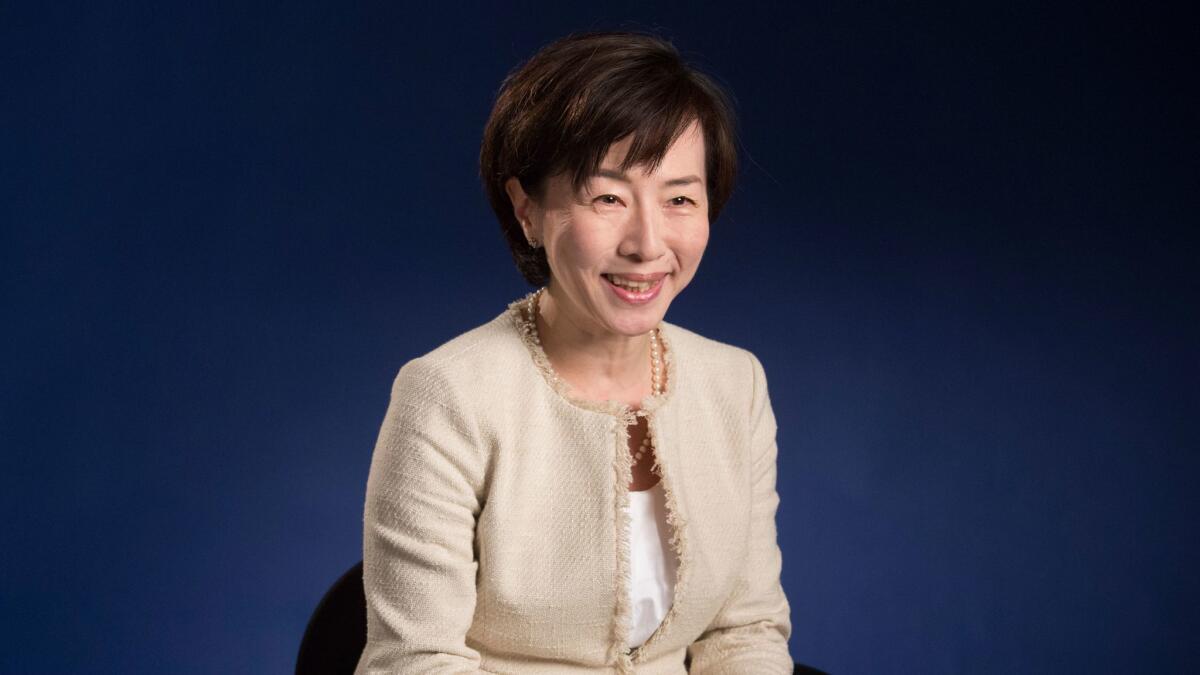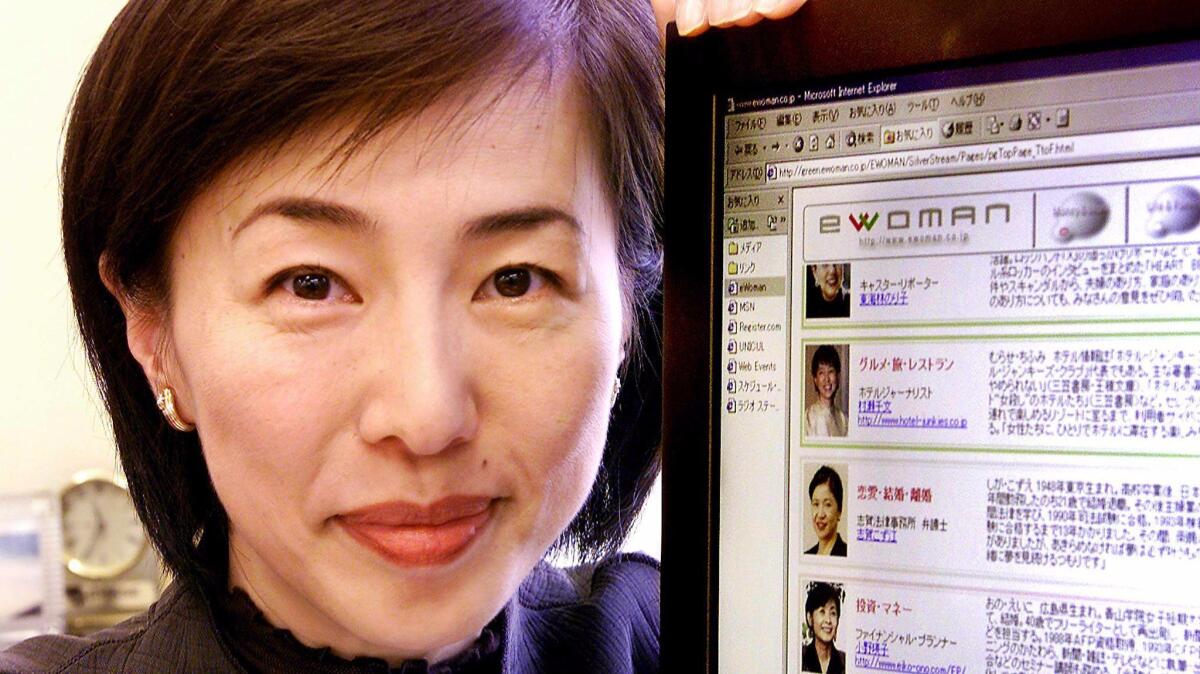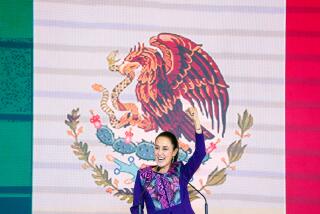Q&A: Women have been named to some of Japan’s top posts, but the country still lags on female empowerment

- Share via
Acknowledging that Japan has failed to fully promote the advancement of women, the Japanese government has pledged to elevate their status in the workplace and in the country’s political arena.
In the last five months, three women assumed high-profile political positions in Japan: The country’s new defense minister, the governor of Tokyo and the leader of the opposition Democratic Party are all women.
In the corporate world, “male business leaders started to view women’s empowerment not as a human rights issue but an economic issue,” said Kaori Sasaki, a prominent women’s rights advocate and president and chief executive officer of ewoman Inc., a think tank and consulting firm.
“Public companies have started to open the doors for women to be on boards — that’s why I’m sitting on several public companies’ boards,” Sasaki told The Times during a recent interview. “Also, companies started doing a lot of training for women [and] promotions for women to higher positions. So we’ve seen a change.”
But is the progress of women moving fast enough?
“No,” said Sasaki, who every year hosts an International Conference for Women in Business in Tokyo and was visiting Los Angeles to speak at symposiums on the economic benefits of empowering women in East Asia.
Take for example, the government’s goal of increasing the proportion of women in senior management roles to 30% by 2020. That target had to be downgraded to 7% for government jobs and to 15% for women in leadership positions in private companies.
Sasaki, a onetime television reporter and anchor, elaborated on her views about the status of Japanese women in comments that have been edited for space and clarity.
Why do you think such goals have never been set before?
In Japan we have a seniority system. Once you graduate from university and go into a company … you stay there for 40 years. It doesn’t really matter how productive you are, but how old you are or how many years you stay in the company is the value for your wage and all the evaluation systems. In that sense, men have been waiting and waiting for years and years to get that seat at management level or that seat on the board. Now the government and everybody says open up the seats for women as well…. Nobody wants to give that up.
Another thing is that ... Japanese labor law is very strict. We are not able to hire a person by yearly salary. We have to hire people by the hour, meaning that the longer you work the more you get. Because of the age and the seniority system and this wage system, the more you stay in the office — meaning that you show your loyalty — your wages are going to be up. Men do not really put much effort into domestic housework. So the men stay at the office and the women take care of the kids and house. This means women have a slower promotion.
Thirty years ago, the equality opportunity law started. However, male companies were very wise. They stopped (describing) positions as men’s work, or women’s work. They created new words, such as general work and clerical work, or national work, international work, or local work. So 99% of men apply for general work, which has a promotional track, and they travel. But 99% of women go for clerical and local work and they stay in the office. The wages are different. And the experience and opportunities are different. So there’s a big difference in the possibility for promotions. That’s is why the pay gap is still big and there is a big gap in the number of women in management.

How do you think Japanese society would change if more women had the opportunity to lead companies and hold political office?
I think the important thing is diversity. Women’s advancement is one step toward diversity … and diversity is not just a percentage of various people. I would emphasize that diversity of point of view is the key for growth. (For example) when you are discussing producing a new product … you would like to have various ideas for the new product. Or if you are writing a news release, it should be checked from various points of view — women, men, the LGBT view. That would lead to better products and services.
What needs to change in the workplace in order for women to play a more productive part?
One thing is when a company hires fresh out of college they should increase the percentage of women. Even though, in the entry exams and interviews, women get a higher score, the company still takes men. Also, there are still those companies who have “general work” positions and “local work” positions. So there are two doors for advancement (one for men, and one for women). I would say there should be just one door. Also, there’s the evaluation system. Usually men are in a higher position to evaluate (employees). So when those women go home early, in many cases those women are not evaluated highly. And the evaluation is related to wages and bonuses.
What is your message to women with regard to empowerment?
I would like the people of the United States to know that Japan has moved, and is moving, forward. We are doing as much as possible in Japan. I would like the United States to give us also a bit of pressure as well. The word gaiatsu means pressure from outside. And Japan is a very unique country. We work very hard and we are a very polite nation. We always think that we are inferior to the whole world. So we listen to outsiders. Especially those men and the leaders — they would like to look good so they would like to live up to whatever the outsider would say. I would like the people in the United States to keep telling us to keep going.
Recently, the World Economic Forum reported the gender gap index [which measures the gaps between women and men in health, education, economy and politics]. Last year, Japan ranked 101 out of 145 countries. This year, out of 144 countries, Japan is 111th. It may be ironic, but I am glad that it went down because the Japanese government has been so proud of the strong leadership of women’s advancement, but this means that it’s not enough. I would like to take this ranking as a very good pressure from outside to keep the government going. We have to do a lot more.
For more on global development news, see our Global Development Watch page, and follow me @AMSimmons1 on Twitter
ALSO
America didn’t get its first female president, but women won in all these places Tuesday
More to Read
Sign up for Essential California
The most important California stories and recommendations in your inbox every morning.
You may occasionally receive promotional content from the Los Angeles Times.











